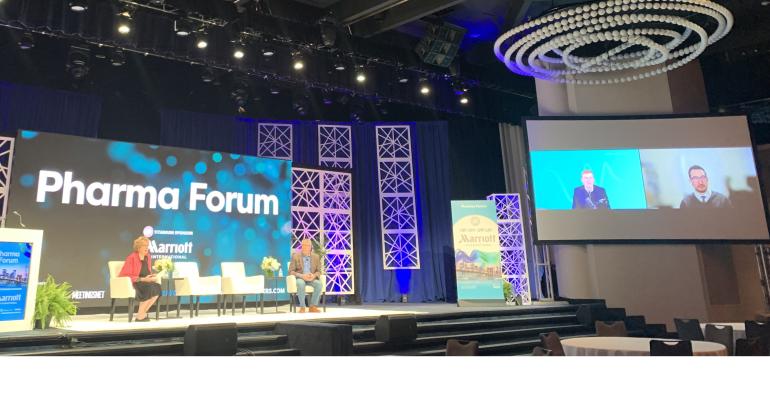One of the highlight sessions for the 300-plus planners who attended Pharma Forum 2023 in New York a few months back was “HCP Perspectives: Designing Meetings Around What HCPs Want, Not What You Want.”
Led by Pat Schaumann, CMP, CSEP, DMCP, HMCC, president of Schaumann Consulting Group and formerly the top medical-meetings consultant at several big event-planning firms, the session featured seasoned physicians who each have attended more than 100 industry and society meetings in their careers. They are Dr. Mark Rowe, a family doctor in Waterford, Ireland for more than 25 years and founder of Waterford Health Park; and Dr. Joseph Murray, co-director of the Lung Cancer Precision Medicine Center of Excellence at Johns Hopkins Medicine in Maryland. Also joining the conversation was Michael Varlotta, HMCC, an expert in medical education, compliance, ethics, and pharmaceutical marketing who spent more than 25 years with Johnson & Johnson.
Speaking Frankly
First, both physician panelists noted that they are invited to 25 to 30 events each year but can attend, at most, just five or six. And Varlotta noted that when he organizes speaker programs, the ratio of invitations to acceptances is about eight to one.
In light of this, planners must hone in on the professional and personal reasons that HCPs consider when choosing which meetings to attend. For instance, Murray said that “hearing from patients and their family caregivers not only provides us with valuable perspectives, but it also reinforces our purpose, grounds us, and motivates us.” Rowe added that “Covid proved how bad it is for humans to be disconnected, so meeting hosts have an opportunity right now to connect with physicians. While data is compelling, stories have real power and bring the lessons to the next level.”
Specifically, Varlotta finds that “a very strong learning experience comes from having a doctor, nurse, and patient on stage to conduct mock office visits. This lets attendees see what roles each person plays in the communication flow for different types of situations.”
Schaumann added that with medical devices being the fastest growing segment of the industry right now, “bringing patients into lunch-and-learn programs lets them share their experiences with a device—what they like and dislike, and what they don’t fully understand.” Such information would be valuable to HCPs, said Rowe and Murray.
More Insight on Meeting Preferences
Other reasons come into play for HCPs as they decide whether to attend a meeting. From a logistical point of view, “airport hotels are being used more often now, because it shortens total travel time,” said Varlotta. Rowe added that “most of us never want to travel on Monday or Friday, so midweek events with travel time accounted for on both sides are best.”
As for content, Schaumann emphasized that “HCPs attend in-person events for the latest findings, but perhaps more so to connect with peers and hear from as many of them as possible. Planners should promote those opportunities in their event communications to HCPs.”
Another interesting observation: “Having some time in an outdoor setting each day is so invigorating—like a refreshment break featuring fruit and granola and other healthy snacks,” said Rowe. “Our patients report less pain and require less time in hospital when they have access to spaces with natural light and fresh air. Why wouldn’t those elements benefit meeting participants, too?”
There is, however, a more personal component involved in HCPs’ event-attendance choices. “Many times, the ‘mini-getaway’ aspect is a deciding factor,” said Schaumann. Murray confirmed this, noting that the quality of a host destination and total travel hours are important to physicians who want to combine a work trip with vacation. “The larger conferences are a good opportunity for family-reconnection time,” he said. “And if it is an international trip for a doctor, that could have additional appeal.”
Virtual Meetings Still Work—When Done Properly
While professionals in most other industries aren’t keen on attending 6 a.m. or 9 p.m. educational sessions even if they’re online, HCPs are an exception. “If you want our full attention, conduct your virtual program before our clinical hours begin,” Murray said. Rowe added that “early is best because we control the start of our day, but then it unravels as patient situations come up.”
Also, the length of a virtual session is important to keeping HCPs both engaged in the moment and willing to participate in future events. “A two-hour session is about the max,” said Rowe. “Six-hour investigator meetings online are not a good idea.” And to keep virtual events within preferable times of day for HCPs scattered around North America, “maybe you split the meeting into two sessions, with physicians from only two time zones in each session,” he added.
Varlotta offered an alternate scheduling possibility. “I’ve seen a lot of 9-to-10 p.m. virtual programs work well. The HCPs have their family-dinner time and settle the kids in, and then they can focus.”
One last observation that could help planners create events that resonate with HCPs, regardless of whether they’re in person or virtual: “Patients remember only about 10 percent of what they hear during a doctor’s visit,” noted Rowe. “Anything that pharma and device companies can do to help us with patient retention of important information would be very helpful."





